update:May 28, 2025
A special interview for the Toyota Foundation’s 50th year anniversary project
Project Memuro helps people with disabilities become self-reliant, aiming to build a town enabling everyone to live and work normally.
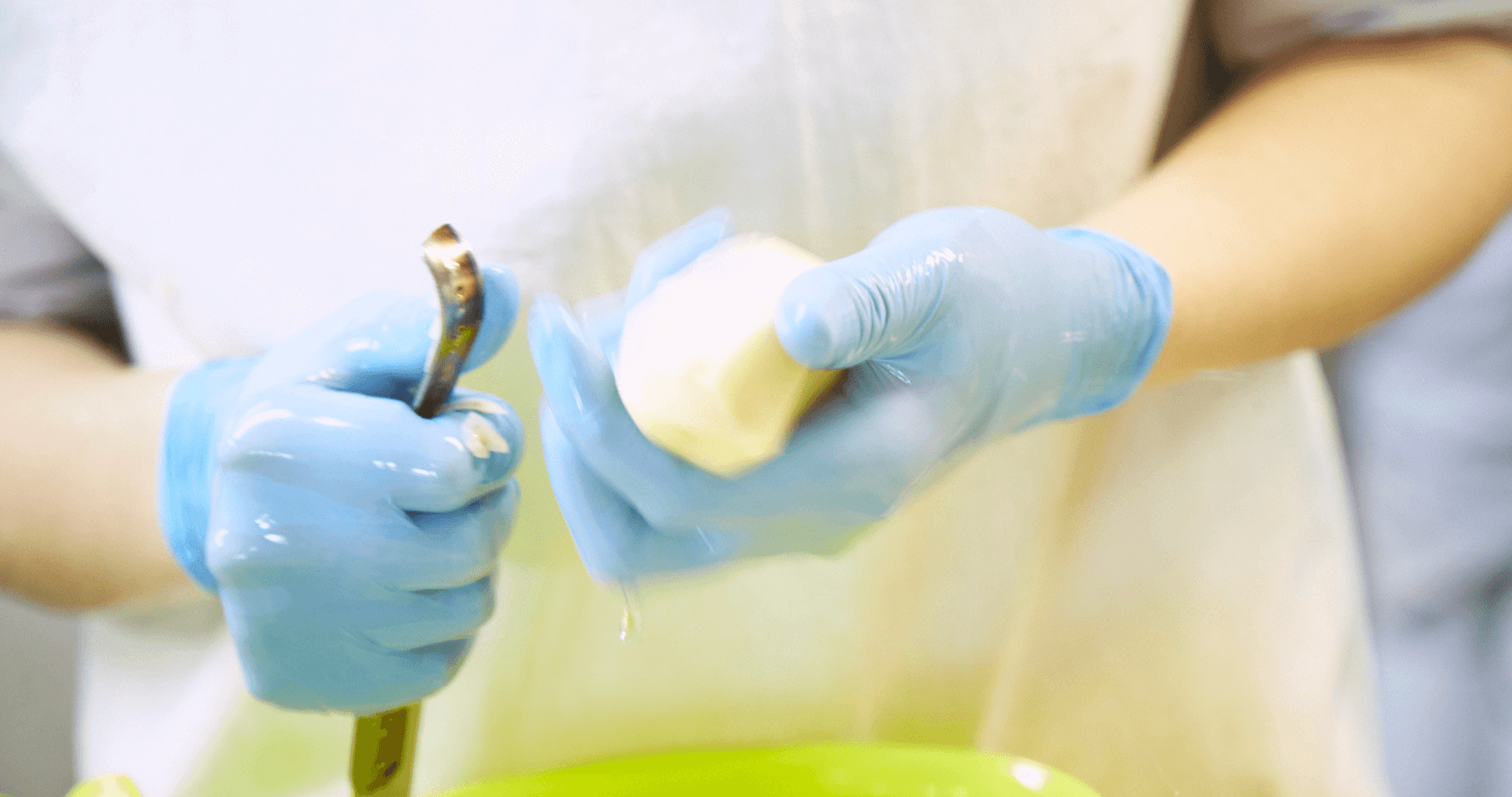
Interviewed by Ryota Mutou
Japanese text written by Nobuaki Takeda
Translated by Naoto Okamura
The town of Memuro, located in central part of Hokkaido, is home to a population of about 20,000, with agriculture as its key industry. In fact, the town is among those municipalities that have been successful in hiring people with disabilities.
Japan’s largest food container maker FP Corp. (FPCO) has a nearly 40-year history of employing people with disabilities, and one of its group companies, Ducks Shikoku (now called FPCO Ducks Co.), launched what is called Project Memuro in 2012 on commission from the Memuro Town municipal government. Under the banner of building “a town enabling everyone to live and work normally,” the company has been seeking to create a system whereby people with disabilities can continue to work even after the passing of their parents.
In 2013, Memuro Town lured a delicatessen producer headquartered in Ehime Prefecture, a business partner of FPCO, to start operating Kyujin Farm Memuro – a type A operator of support for continuous employment – and has since been creating jobs for people with disabilities. The Toyota Foundation made grants to this project in 2014 and 2016.
Kyujin Farm Memuro now serves as a role model for employing people with disabilities. In an interview, FPCO Ducks President Kumi Iwai talks about the significance and outcomes of the project.
Details
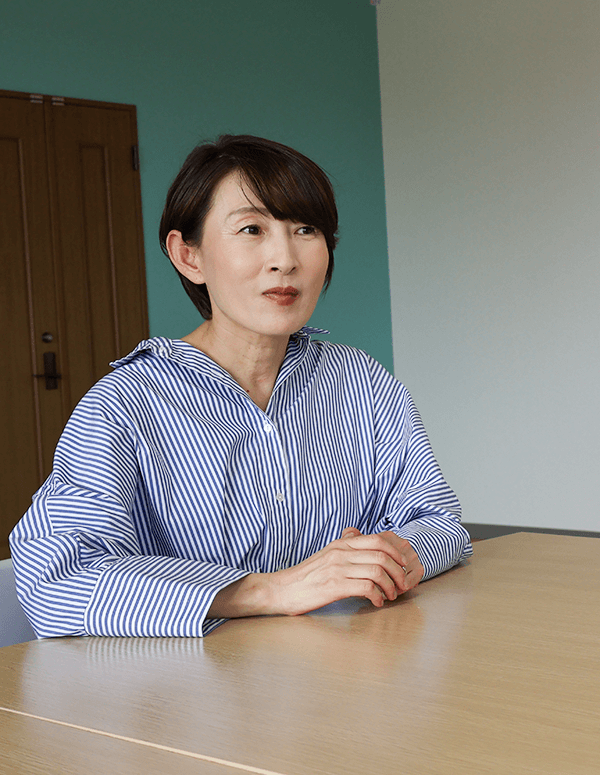
- Program
- 2014 Grant Program for Community Activities in Japan
- Project Title
- Aiming to build a town enabling everyone to live and work normally – what can be achieved by people with disabilities and us
- Grant Number
- D14-L-0018

- Grant Period
- April 2015 to March 2017
- Main area of activity
- Hokkaido
- Abstract of Project Proposal
- The majority of people with disabilities live their lives without enjoying precious experiences in life – earning an income enough for independent living, a sense of achievement and self-fulfillment through work, a sense of pride in being of service to others, among other sentiments.
The town of Memuro, with its population of about 20,000, faces a host of challenges such as a lack of employment of people with disabilities by companies, a shortage of agriculture workers, a declining working population caused by fewer children and more seniors, a dearth of job opportunities for young people. This project aims to re-energize a local community by achieving these initiatives: introducing a job and career education program, setting up a system for sharing and sustaining work skills among people with disabilities, and building a new job transfer system that was not possible under the existing social welfare framework.
- Program
- 2016 Communication with Society Program
- Project Title
- Disseminating the scheme of livelihood support as the base to work and live
- Grant Number
- D16-SC-0002

- Grant Period
- April 2017 to March 2018
- Abstract of Project Proposal
- For the Social Communication Program, based on a track record of employment support, this project intends to conduct a survey on the current situation of working people with disabilities nationwide, produce a report on survey results, and present a policy proposal. In addition, the project carries out a pilot program of livelihood support for people with disabilities, seeks to create and spread the outcomes of livelihood support and build a scheme for supporting the independence of people with disabilities, thereby creating a society which people can say allows everyone to live and work.
How the Project Memuro came about
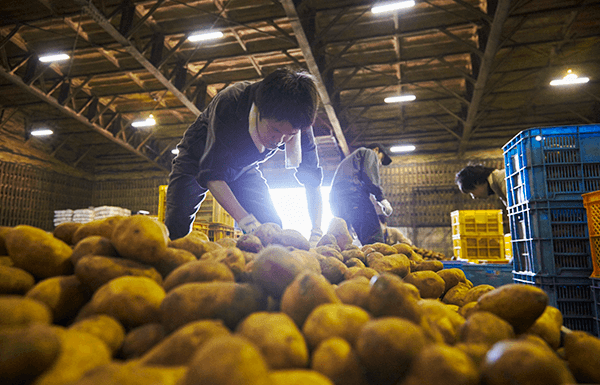
Japan had a total of about 11.65 million people with disabilities, including 6.1 million disability certificate holders and 230,000 people who do not have a certificate but receive disability welfare services, according to the 2022 survey on difficult livelihood (a nationwide survey on in-home children and adults with disabilities) released in May 2024 by the Ministry of Health, Labour and Welfare. Moreover, the 2023 employment status survey of people with disabilities, released in December 2023 by the ministry, shows that people with disabilities working at private companies numbered 640,000 and those working at public institutions -- the central, prefectural, and municipal governments, as well as boards of education – stood at 73,000, underscoring the difficult employment situation facing people with disabilities.
Kyujin Farm Memuro has a three-hectare field of land on which it grows potatoes and other vegetables used to make potato salad and croquettes. The potatoes cultivated there go through the primary steps of getting them peeled off, cut up, and vacuum-sealed at a food-processing factory, and then all are purchased by Cookchum Co., Ltd., the parent company of Kyujin Farm Memuro that makes and sells prepared food items. Currently, a total of 26 workers, comprised of 20 facility users with disabilities and six supporters (including three of them have disabilities of their own), engage in the operations.
The establishment of Kyujin Farm Memuro was coordinated by FP Corp., a company known for manufacturing disposable food containers. The company also puts much effort into recycling business and hiring people with disabilities. Under the law, Japanese companies are required to meet the legal employment quota of 2.5% for persons with disabilities, but FPCO Group, including mainly through its special subsidiary company FPCO Ducks, employes a great number of persons with disabilities, boasting the employment ratio of as high as about 13%. “We are highly recognized by society for our success in turning people with disabilities into competent workforce,” said Ms. Kumi Iwai, president of FPCO Ducks.
In 2012, then town mayor Yoshinori Miyanishi, who hailed from the educaiton sector, was enthusiastic about efforts on children with disabilities. “But once they finish school, there is no place for them to work. When I came to the town of Memuro, there were about 600 people who held disability certificates but none of them was working at private companies,” she said.
Mr. Miyanishi, the former town mayor, wanted to do something about that situation and approached FPCO. Initially, FPCO Ducks declined his request, but the mayor did not relent in his approach. Then one day, Ms. Iwai, who was a section manager at the time, headed to Memuro Town to formally turn down the request for help. It was her first visit to the town where she saw farm lands stretch as far as the eye could see. She asked her counterparts about what the key industry of the municipality was[NO1] , only to find that it was agriculture. “Then, they started bragging about their local agriculture, boasting about wonderful stories about the largest production volume of sweet corn in Japan and a profitable agriculture business with a household annual income of 40 million yen,” she said with a laugh. “Our business partners are food-related businesses, such as supermarket and restaurant operators. So, it occurred to me that we could do something with the potential of the Tokachi Plain and Tokachi’s agriculture.” Something changed in her heart about the former town mayor’s request.
Ms. Iwai suggested to then Mayor Miyanishi that people with disabilities should be hired to work in agriculture. But he seemed to dismissed the idea as not so realistic, saying that “Such hard work is not possible for people with disabilities.” Instead, she asked him if he was willing to extend full support if a system would be put in place for employing people with disabilities in agriculture throughout the year. “Then, he answered he would do his very best,” she said.
At the end of the day, she didn’t decline and returned to the company. Her higher-ups were surprised, but she figured she would be able to turn her idea into a viable business based on her experiences thus far. One of her plans was to collaborate with Cookchum Co., Ltd because the president of the prepared food producer recognized the value of employing people with disabilities. She involved the Japan Agricultural Cooperatives (JA), studied various things and prepared presentation materials. She made a fervor pitch to Cookchum’s president, talking about possible scenarios for summer and winter, the use of Memuro potatoes for potato salad and croquette, an estimated profit, and no risk of loss. She emphasized that this project had a dream and she would like to do this work together that could also contribute to a local community. Her passion resonated with the corporate leader, which eventually led to the collaboration with Cookchum.
What’s more, she worked in close tandem with Memuro Town. “First, I cooperated with the commerce and industry department of the town office. Basically, the welfare division for persons with disabilities is responsible for things related to social welfare for such people. But officials of that division are not knowledgeable about employment or don’t understand what kind of workers that companies seek,” Ms. Iwai said. “There is a factory complex in Memuro Town, and it is the commerce and industry department that supervises that area.” In the end, she worked closely with the municipality’s four departments -- those of commerce and industry, agriculture, local revitalization, and welfare for people with disabilities – and pressed ahead with the project.
In 2012, FPCO Ducks, Cookchum, Memuro Town, and local residents worked as one to launch what is called Project Memuro.
Food Processing Facility, Kyujin Farm Memuro
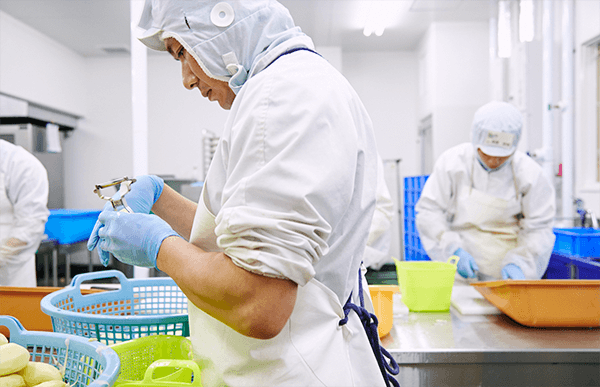
She first began to buy a plot of land for a proposed work facility, and started talking carefully to local residents that it would be used as a facility for employing people with disabilities in addition to revitalizing the locality. “Actually, there was a farmer family who had a child with a disability. With their help, we successfully secured a 3-hectare plot of farm land.”
In 2013, the processing facility Kyujin Farm began its operations and made good on the year-round employment of people with disabilities. It started with a staff of 9 members. Initially, some in Memuro’s agriculture industry were skeptical about companies from outside Hokkaido operate the facility in a sort of remote manner. But that mood of skepticism is now gone. “We have never fallen into the red, not even once so far. We have continued to pay salaries since the start of the operations, the mood of the town has changed,” Ms. Iwai said.
Not only that, some of Kyujin Farm staff members with disabilities eventually landed jobs at ordinary companies. As the facility has made such achievements, those skeptical residents have become very supportive. She thinks Kyujin Farm is a support center for continuous employment type A -- a facility that provides the necessary job training, support, and employment opportunities to connect people with disabilities to ordinary jobs -- that has produced the largest number of workers with disabilities employed by ordinary companies in the country. Type A support centers enter into an employment agreement with people with disabilities and have them covered by social insurance, so many of these centers are less motivated to lead them to employment at ordinary companies. “But it is necessary to leave spots open for other people with disabilities and these type A support centers are partly funded with tax money. So, I tell our staff members with disabilities that moving on to leave spots open for others is the act of returning favor, encouraging them to be independent,” Ms. Iwai said. As a result, some of them went on to work in farming while others work in supermarkets.
As such, she has had no intention to introduce lifetime employment at Kyujin Farm. “Children with disabilities are born every year, so we should not keep them working at Kyujin Farm for good. Rather, we should nudge them to leave us and work somewhere else. I have always wanted to leave spots open at this facility and keep it as a place for training new staff members,” she said.
In other words, she finds it necessary to build a cycle of hiring and training people with disabilities, finding jobs for them at ordinary companies, helping with their job retention, and then hiring new groups of people with disabilities. “After leaving Kyujin Farm, they become effective workers, helping to mitigate worker shortages in Memuro Town. If we can make a success in this small town, that will prove that this system can work anywhere in Japan,” she said.
Moreover, Ms. Iwai has wanted people with disabilities and their family members to change their mindsets. “Healthy children can gather information on their own and open new doors, without their parental support,” she said. “However, children with disabilities are passive. What is given by their parents and teachers means everything for them. In urban areas, there are places for people with disabilities to work but there is hardly any place like that in rural areas. That’s why they don’t even know they can actually work properly.” It is significant that Kyujin Farm has set a precedent where people with disabilities learn they can play a part in society. This gives Memuro Town a ray of hope for the future.
Commuting bus support
Commuting presents a challenge when it comes to the employment of people with disabilities in rural areas. It is true that one has to drive to work in remote areas of Japan. Not a few of them could not land jobs because they were unable to drive to work. So, she came up with the idea of setting up an NPO for commuting support and started chauffeuring them to around 10 work places.
This commuting support is conducted not as an NPO’s outsourced project but under the framework of the so-called community activity support center. An NPO’s outsourced project needs to be approved by a local town assembly but there is no guarantee that approval is given every year. On the other hand, community activity support center is deemed as a welfare service, thus making it easier to keep the commuting support service running. This pick-up and drop-off service charges 4,000 yen per month for a round trip of up to 10 kilometers, 8,000 yen up to 20 kilometers, and 12,000 yen up to 30 kilometers. It is like employers in rural areas paying for gasoline costs in the form of transportation fees.
These people with disabilities face various difficulties even after they start working at ordinary companies. For instance, they come under more pressure after the new head of a factory is assigned. They may quit due to mental stress. That’s why commuting support staff members ask them if they have any problem at work or something to worry about. It is important not to leave them alone. As these members drive to their work places every day, they sometimes get information from company officials about job opportunities ahead of local public job placement offices.
What’s more, Project Memuro staff members offer advice on employment of people with disabilities to employer companies, just as they usually do at FPCO Ducks. As such, this system proves to benefit all three parties – people with disabilities, Project Memuro itself, and employers.
In addition to running Kyujin Farm’s factory, Project Memuro also used to engage in tourism business at a publicly-run accommodation facility Shin Arashiyama Inn in Memuro Shin Ayarashiyama Sky Park and employed people with disabilities there. They would provide service to customers and do bed making. “It is not able-bodied staffers but workers with disabilities that attend to customers,” Ms. Iwai said. “We arranged for special-needs school study tours for children with disabilities to see what it is like for people with disabilities to work on the ground. That can give children a dream and hope for being able to work like that as grown-ups in the future.”
This initiative has proven to be a big success because these working people with disabilities received respect and admiration. There was a person who remained socially reclusive for six years due to developmental disorder. When asked how things had changed before and after taking up a job, this person said “I have less free time, but I have more things to decide at my own discretion,”
Unfortunately, the publicly-run accommodation facility was closed in 2023. The once-reclusive person returned his/her disability certification and has become a mentally stable and healthy adult. “I have witnessed with my own eyes how powerful the act of working really is,” Ms. Iwai said.
Sea Glass Memuro after-school daycare program
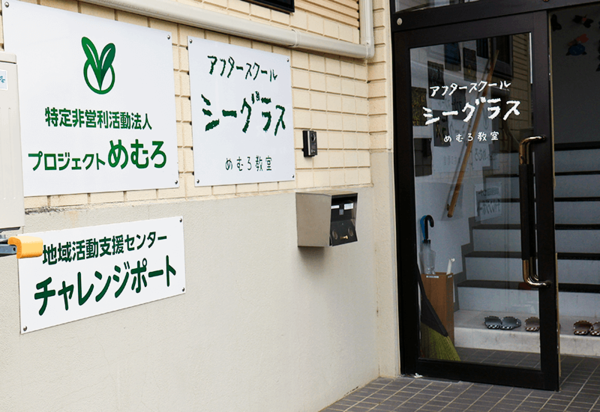
The other pillar of Project Memuro involves the operations of an after-school daycare service called Sea Glass Memuro Classroom, a facility designed for children who attend school but are deemed in need of developmental support and those mentally and intellectually disabled children.
There are about 30 registered children, ranging in age from elementary school to high school. On average, eight children come to the Sea Glass after-school daycare, which is different from other regular daycare programs. “There is another Sea Glass classroom in Kochi Prefecture, and Sea Glass facilities offer programs designed for children with disabilities to learn to work and live by tapping into a network of support staffers engaged in employment of people with disabilities and partner companies of Memuro Project,” Ms. Iwai said. For instance, Sea Glass provides various programs that help such children to imagine what is like to participate in society, including support for independent livelihood, learning how to work and do shopping. What’s more, it also organizes experiential learning programs appropriate to the season, including growing, harvesting, and cooking of vegetables.
Project Memuro’s goals and dream ahead
Ms. Iwai also envisions the idea of “serving as a place for passing experience from working people with disabilities to young people with disabilities.” This is about building a multiple-purpose facility centered around an after-school daycare service specializing in services and support for persons with disabilities. This means that there will be a type A support center that runs a restaurant employing people with disabilities, an evolved form of Kyujin Farm, and next to it is an after-school daycare facility where children with disabilities learn what it means to work and aim to obtain work in the future. In other words, it is about building a Sea Glass-like facility adjacent to a workplace for people with disabilities.
“In Japan, what many daycare facilities for children with disabilities do is just to play DVDs and give snacks. Almost all of them simply keep children for certain hours,” Ms. Iwai said. “In contrast, our concept will allow children to see people with disabilities working at a restaurant and give children a sense of motivation. For that to happen, it is necessary to have both facilities next to each other, create a space where other people can see working adults with disabilities daily, and have a place where children can spend their after-school hours.”
The other goal is to create a community employment hub for people with disabilities. It will serve as a meeting place for those who have disabilities working at local businesses to come to talk and also act as a station for the commuting support bus. This represents a one-stop support facility for people with disabilities from their childhood years to employment by ordinary companies.
When parents have a child with a disability, they often cannot afford to have another child. But with a sufficient support system in place, some parents may feel encouraged to have another child. When these goals are achieved, Ms. Iwai will be able to realize her Project Memuro’s stated dream of creating a space and system for every single person, with or without disability, to be treated as precious and irreplaceable individuals.
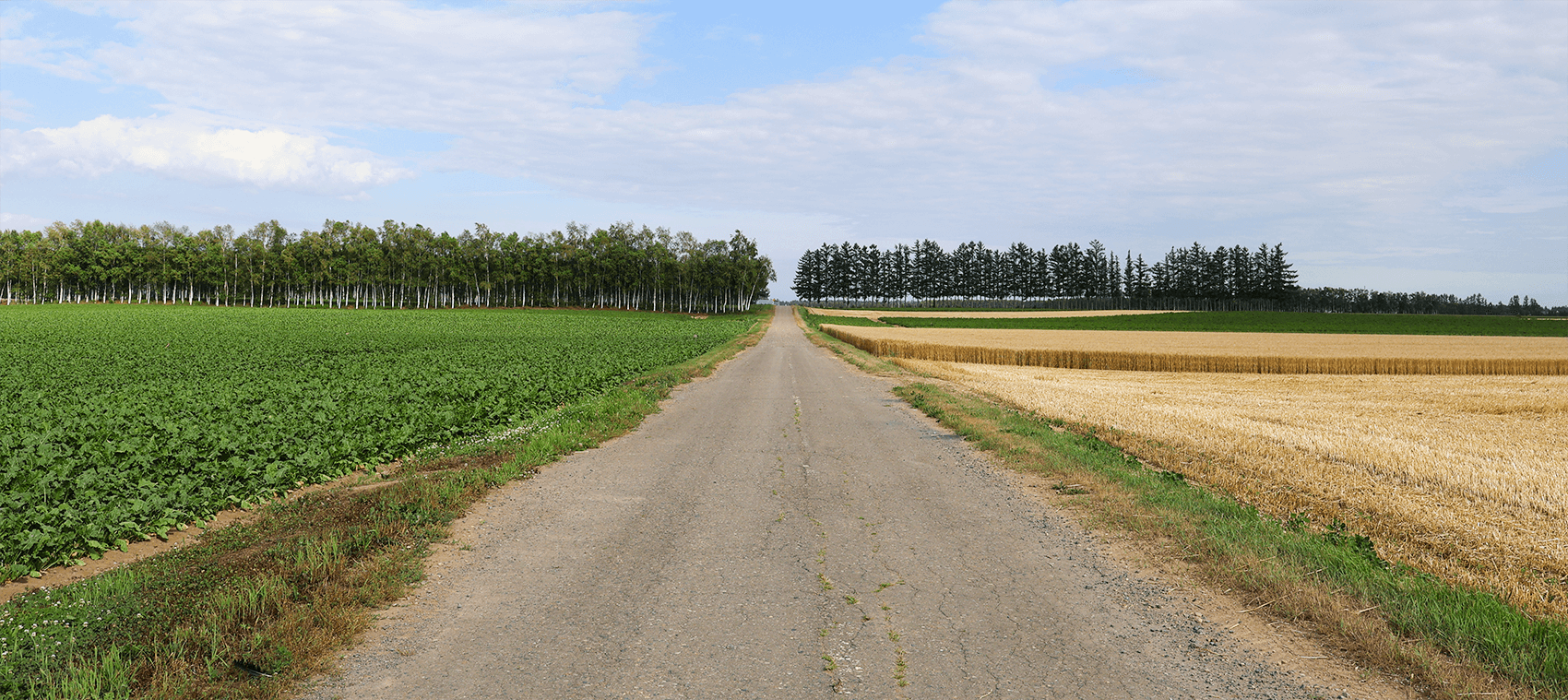
◯ Notes on a visit to Kyujin Farm and Sea Glass
Memuro Town is located next to Obihiro City, a heartland of agriculture in Japan’s northernmost island of Hokkaido. A 10-minute drive from the center of Memuro Town takes you to vast fields of farmland that stretches as far as the eye can see, as a Toyota Foundation staff member put, “This is what Hokkaido should look like, with a road stretching straight far ahead.” The Toyota Foundation made grants in 2014 and 2016 to two projects: Kyujin Farm and Sea Glass Memuro.
Amazing dexterity of workers at Kyuji Farm
Inside the Kyujin Farm building, a factory is behind a large window down in the left corridor and workers were seen peeling off potatoes. As they all were in white workwear, it was not easy to distinguish workers with disabilities wearing a blue cap from staff members wearing a white cap.
Those who have disabilities were peeling off potatoes quickly with amazing dexterity, a far cry from the author’s kitchen knife technique. Since the amount of the potatoes harvested from Kyujin Farm is not enough, they skin the new potatoes sourced from the local branch of the Japan Agricultural Cooperatives (JA).
Creative ideas implemented all over at Sea Glass
Sea Glass Memuro Classroom is a support facility for children who attend school but are deemed in need of support due to concerns over their development, and children with mental and intellectual disabilities. It offers an after-school daycare service for children with disabilities, a necessary support program for them to learn how to become self-sufficient while having fun.
There is an open space inside the Sea Glass Memuro facility. It follows a routinely scheduled process starting from an opening meeting, a program, a free activity, cleaning up, and to a wrap-up meeting.
Sea Glass conducts a very well-thought-out program activity for children, and one of the key features is to employ the use of sea glass pieces as a currency within the facility. When children complete the program’s tasks, they are given a piece of sea glass. When they have accumulated a certain amount of sea glass pieces, they can do what they do.
In other words, the program is designed to help teach children about how society works and help them learn how to gain money through the completion of the program’s tasks and use that money to buy products.
Sea Glass does not let children watch DVDs and wait for their parents to come pick them up. That kind of practice is not conducted at Sea Glass.
